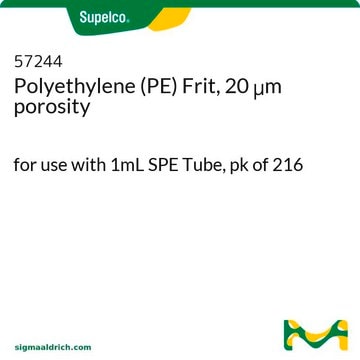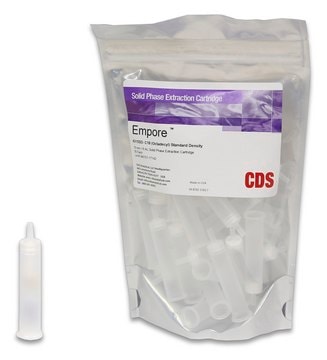55508-U
Discovery® Glycan SPE Bulk Packing
pkg of 50 g
Autenticatiper visualizzare i prezzi riservati alla tua organizzazione & contrattuali
About This Item
Codice UNSPSC:
41115712
NACRES:
NB.21
Prodotti consigliati
Confezionamento
pkg of 50 g
Livello qualitativo
tecniche
solid phase extraction (SPE): suitable
Impurezze
<5% Water content
Matrice
polyamide resin base material
Gruppo funzionale matrice
amide, poly- phase
Dimensione particelle
50-160 μm
Intervallo di pH
4.5-7.5(surface pH)
Densità bulk
0.2‑0.3 g/mL
Tecnica di separazione
reversed phase
Categorie correlate
Descrizione generale
Retention Mechanism: Reversed-phase
Sample Matrix Compatibility: Aqueous or methanolic solutions
Sample Matrix Compatibility: Aqueous or methanolic solutions
- Polyamide Resin: Particle Size: 50-160 μm, Surf pH: 4.5-7.5, Density: 0.2-0.3 cm3/g, Water Content: < 5 %
- Useful for extracting gylcans from aqueous solutions.
- Used to adsorb polar compounds (-OH groups, esp. phenolic compounds) from aqueous or methanolic solutions under the reversed-phase mechanism through strong hydrogen bonding between compound hydroxyl groups and amide groups of the resin
- Also may be used for the extraction of tannins, chlorophyll, humic acid, pharmacologically active terpenoids, flavanoids, gallic acid, catechol A, protocatechuic acid, phloroglucinol, aromatic carboxylic acids, and nitroaromatic compounds
- Irreversibly retains quinones.
Note legali
Discovery is a registered trademark of Merck KGaA, Darmstadt, Germany
Codice della classe di stoccaggio
11 - Combustible Solids
Classe di pericolosità dell'acqua (WGK)
WGK 3
Punto d’infiammabilità (°F)
Not applicable
Punto d’infiammabilità (°C)
Not applicable
Choose from one of the most recent versions:
Possiedi già questo prodotto?
I documenti relativi ai prodotti acquistati recentemente sono disponibili nell’Archivio dei documenti.
Hsin-Yuan Chen et al.
Cellular physiology and biochemistry : international journal of experimental cellular physiology, biochemistry, and pharmacology, 49(5), 1970-1986 (2018-09-21)
Uterine leiomyomas (ULs) are benign uterine tumors, and the most notable pathophysiologic feature of ULs is excessive accumulation of extracellular matrix (ECM). Fucoidan is a polysaccharide extracted from brown seaweeds that has a wide range of pharmacological properties, including anti-fibrotic
Haley Shelley et al.
AAPS PharmSciTech, 19(6), 2554-2563 (2018-06-28)
Nepafenac is a nonsteroidal anti-inflammatory drug (NSAID), currently only available as 0.1% ophthalmic suspension (Nevanac®). This study utilized hydroxypropyl-β-cyclodextrin (HPBCD) to increase the water solubility and trans-corneal permeation of nepafenac. The nepafenac-HPBCD complexation in the liquid and solid states were
Wei Liu et al.
Glycobiology, 28(6), 363-373 (2018-03-22)
O-linked N-acetylglucosamine (O-GlcNAcylation) is an important post-translational modification on serine or threonine of proteins, mainly observed in nucleus or cytoplasm. O-GlcNAcylation regulates many cell processes, including transcription, cell cycle, neural development and nascent polypeptide chains stabilization. However, the facile identification
Qi Gu et al.
Methods in molecular biology (Clifton, N.J.), 1758, 129-138 (2018-04-22)
Bioprinting provides an opportunity to produce three-dimensional (3D) tissues for biomedical research and translational drug discovery, toxicology, and tissue replacement. Here we describe a method for fabricating human neural tissue by 3D printing human neural stem cells with a bioink
Qingxin Cui et al.
Frontiers in pharmacology, 9, 948-948 (2018-09-07)
Purpose: Understanding the distribution and interaction of the Traditional Chinese Medicines (TCMs) is an integral source of herbal drug discovery. An optimized radio-labeled method was explored that could conduct in situ biodistribution studies in animals. We evaluated the feasibility of
Articoli
Reversed-phase interaction will retain most molecules with hydrophobic character; it is very useful for extracting analytes that are very diverse in structure within the same sample.
Il team dei nostri ricercatori vanta grande esperienza in tutte le aree della ricerca quali Life Science, scienza dei materiali, sintesi chimica, cromatografia, discipline analitiche, ecc..
Contatta l'Assistenza Tecnica.





